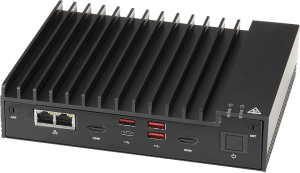What is an IoT Gateway?
An Internet of Things (IoT) Gateway serves as a critical bridge between IoT devices or sensors and the Internet or cloud. It plays a key role in data collection, device connectivity, and intelligent data processing in IoT ecosystems. IoT gateways enable the connection of various devices that might not be natively designed for internet connectivity, facilitating the integration of traditional systems with modern IoT networks.
IoT gateways perform multiple functions, including data aggregation from sensors, translation of different communication protocols, pre-processing of data, and secure communication to and from the cloud or a central server. By handling these tasks, IoT gateways ensure the seamless flow of data in IoT systems, contributing significantly to the efficiency and effectiveness of IoT applications.

Key Functions of an IoT Gateway
Protocol Translation: IoT gateways translate between various communication protocols used by different devices, ensuring interoperability in the IoT network.
Data Processing and Filtering: They process and filter the data collected from IoT devices, sending only relevant information to the cloud, which reduces bandwidth usage and enhances efficiency.
Security: IoT gateways provide a crucial layer of security, including data encryption and secure data transmission, protecting the IoT network from potential vulnerabilities.
Device Management and Configuration: They assist in managing and configuring connected devices, including firmware updates and troubleshooting.
In summary, IoT gateways act as the cornerstone of modern IoT architectures, offering a means to bridge the gap between various devices and advanced cloud-based analytics and data processing capabilities.
Applications and Benefits of IoT Gateways
Applications of IoT Gateways
IoT Gateways have a wide range of applications across various sectors, demonstrating their versatility and importance:
Smart Homes: In smart home environments, IoT gateways connect various smart devices, such as thermostats, lighting systems, and security cameras, enabling centralized control and automation.
Industrial Automation: They are crucial in industrial settings for connecting sensors and machines, facilitating real-time monitoring and control of industrial processes.
Healthcare: IoT gateways aid in the collection and transmission of data from medical devices, improving patient monitoring and healthcare delivery.
Agriculture: Used in precision agriculture, they help in gathering data from soil sensors, weather stations, and other agricultural devices to optimize farming practices.
Transportation: In transportation systems, IoT gateways assist in vehicle telematics and fleet management by aggregating data from various vehicular sensors.
Benefits of IoT Gateways
The deployment of IoT Gateways brings several key benefits:
Enhanced Connectivity: They enable the connection of a wide range of devices with different protocols to the Internet, expanding the capabilities of those devices.
Improved Data Management: By processing and filtering data at the edge, IoT gateways reduce the volume of data sent to the cloud, leading to more efficient bandwidth usage and quicker response times.
Increased Security: IoT gateways provide an additional layer of security for IoT networks, including data encryption and secure transmission, which is crucial given the potential vulnerabilities in IoT environments.
Remote Monitoring and Management: They allow for the remote monitoring and management of devices, which is particularly beneficial in large-scale and geographically dispersed IoT deployments.
Cost-Effectiveness: By reducing data transmission requirements and simplifying network architecture, IoT gateways can help in reducing operational costs.
IoT gateways thus play a vital role in the scalability, security, and efficiency of IoT systems, making them an indispensable component in the ever-growing field of IoT.
Frequently Asked Questions about IoT Gateway
- What are the 4 functions of an IoT gateway?
An IoT gateway primarily handles protocol translation, converting various communication protocols of IoT devices to a unified standard. It aggregates and processes data from devices, optimizes network traffic through data filtering, provides robust security features like encryption, and facilitates device connectivity and management. - What is a field gateway in IoT?
In IoT, a field gateway acts as an intermediary between sensors or devices in the field and the cloud or central system. It's especially useful where devices may not have direct internet access or use different communication protocols. The field gateway preprocesses and aggregates data from these devices before transmitting it to the cloud or a main server. - What are the advantages of using an IoT gateway?
Using an IoT gateway offers enhanced data management, reducing network traffic by local data processing and filtering. It ensures better security through encryption and secure communication, facilitates interoperability among various IoT devices, and simplifies device management in large-scale IoT networks. - How do IoT Gateways enhance the security of IoT networks?
IoT Gateways bolster network security through data encryption, secure transmission channels, and firewall protection, acting as a crucial checkpoint for data and protecting against unauthorized access and cyber threats. - Can IoT Gateways operate with different IoT protocols?
Yes, IoT Gateways are adept at operating with a range of IoT protocols. Their ability to translate and interpret various communication standards is essential for integrating diverse IoT devices into a cohesive network. - What is the role of IoT Gateways in data processing?
In data processing, IoT Gateways serve as focal points for data aggregation from IoT devices, performing preliminary processing and filtering to ensure that only pertinent data is sent to the cloud, thus making network resource use more efficient. - How do IoT Gateways contribute to energy efficiency in IoT devices?
By handling data processing locally, IoT Gateways reduce the need for constant cloud communication, thereby conserving the power consumption of IoT devices and contributing to the overall energy efficiency of the IoT ecosystem. - Are IoT Gateways necessary for all IoT applications?
The necessity of IoT Gateways depends on the complexity and scale of the IoT application. They are crucial in complex or extensive networks for efficient management and operation, but simpler systems with direct internet connectivity may not require them.